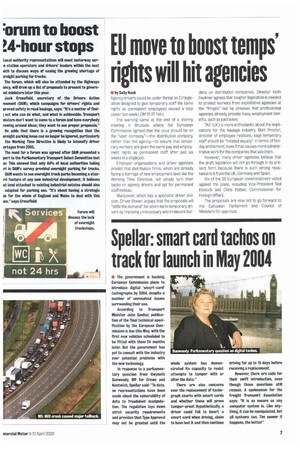EU move to boost temps'
Page 7

If you've noticed an error in this article please click here to report it so we can fix it.
rights will hit agencies
• by Sally Nash
Agency drivers could be under threat as EU legislation designed to give temporary staff the same rights as permanent employees moved a step closer last week (CM 21-27 Feb).
The warning came at the end of a stormy meeting in Brussels where the European Commission agreed that the onus should be on the "user company"—the distribution company, rather than the agency—to ensure that temporary workers are given the same pay and employment rights as permanent staff after just six weeks in a single job.
Employer organisations and driver agencies predict that distribution firms, which are already facing a barrage of new employment laws like the Working Time Directive, will simply turn their backs on agency drivers and opt for permanent staff instead.
Manpower, which has a specialist driver division. Driver Power, argues that the proposals will "stifle the demand" for short-term temporary drivers by imposing unnecessary and irrelevant bur dens on distribution companies. Director Keith Faulkner agrees that tougher legislation is needed to protect workers from exploitative agencies at the "fringes" but he stresses that professional agencies already provide many employment benefits, such as paid leave.
TNT (UK) is more enthusiastic about the implications for the haulage industry. Bert Proctor, director of employee relations, says temporary staff should be "treated equally" In terms of holiday entitlement, even if that causes more administrative work for the companies that use them.
However, many driver agencies believe that the draft legislation will not go through in its present form because there is such strong resistance to it from the UK, Germany and Spain.
Six of the 20 European commissioners voted against the plans, including Vice-President Neil Kinnock and Chris Patten, Commissioner for Foreign Affairs.
The proposals are now set to go forward to the European Parliament and Council of Ministers for approval.
















































































































































